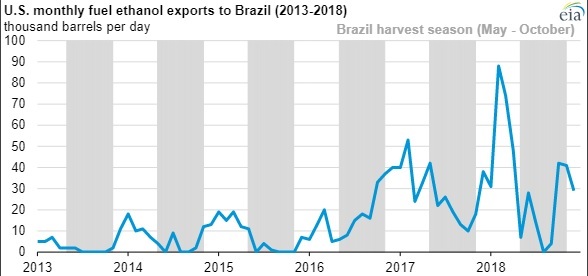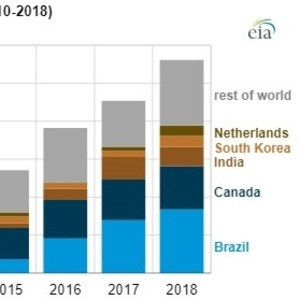EIA: US exports record volume of ethanol in 2018



April 29, 2019
BY U.S. Energy Information Administration
The United States exported 112,000 barrels per day (b/d) of fuel ethanol in 2018, surpassing the record high of 91,000 b/d set in 2017. At the same time, U.S. imports of fuel ethanol decreased about 30 percent in 2018 to less than 4,000 b/d, which resulted in the United States exporting more fuel ethanol than it imported for the ninth year in a row.
U.S. fuel ethanol exports grew nearly 25 percent in 2018 even though the number of export destinations decreased by half, down to 17 destinations in 2018. About half of all ethanol was shipped to Brazil or Canada, which increased annual U.S. fuel ethanol receipts (or imports) by 20 percent and 7 percent, respectively.
Brazil, the world’s second-largest producer and consumer of fuel ethanol, increased imports of U.S. ethanol for the fifth consecutive year, reaching over 33,000 b/d in 2018 and accounting for nearly one-third of all U.S. ethanol exports. Ethanol consumption in Brazil is driven largely by a fuel ethanol blending mandate, which is currently set at 27%, and demand for hydrous ethanol (E100) that competes with traditional gasoline blends at the pump.
Advertisement
Ethanol in Brazil is primarily produced from sugarcane, and as a result, it is seasonally driven by the sugarcane harvest period from May through October. Ethanol production in Brazil typically peaks during the third quarter of each year.
In early 2018, the price discount associated with ethanol from the United States led to monthly record-high levels of U.S. fuel ethanol exports to Brazil. U.S. exports to Brazil reached nearly 6 million barrels (a rate of 63,000 b/d) in the first quarter of 2018, 64 percent higher than in the first quarter of 2017. Almost half of the total volume of ethanol exported to Brazil in 2018 was exported in the first quarter. These export levels increased despite Brazil’s introduction in September 2017 of a new 20 percent tariff levied on U.S. ethanol volumes that surpass 150-million-liter quarterly quotas (about 1 million barrels).
Canada remained the second-largest destination of U.S. ethanol, importing nearly 23,000 b/d in 2018. Canadian demand for U.S. fuel ethanol is driven by different ethanol mandates for gasoline across Canadian provinces, which range between 5.0 percent and 8.5 percent.
Advertisement
The third-largest destination for U.S. ethanol was India at 10,000 b/d, followed by South Korea and the Netherlands. The remaining 12 countries received just under 35,000 b/d of U.S. ethanol exports.
The United States imported a limited amount (4,000 b/d) of sugarcane ethanol in 2018, almost entirely from Brazil. U.S. ethanol imports have been low in recent years because of strong domestic production levels along with a preference for biomass-based diesel over imported sugarcane ethanol to meet both the Renewable Fuel Standard and California’s Low Carbon Fuel Standard.
Related Stories
The U.S. Energy Information Administration maintained its forecast for 2025 and 2026 biodiesel, renewable diesel and sustainable aviation fuel (SAF) production in its latest Short-Term Energy Outlook, released July 8.
XCF Global Inc. on July 10 shared its strategic plan to invest close to $1 billion in developing a network of SAF production facilities, expanding its U.S. footprint, and advancing its international growth strategy.
U.S. fuel ethanol capacity fell slightly in April, while biodiesel and renewable diesel capacity held steady, according to data released by the U.S. EIA on June 30. Feedstock consumption was down when compared to the previous month.
XCF Global Inc. on July 8 provided a production update on its flagship New Rise Reno facility, underscoring that the plant has successfully produced SAF, renewable diesel, and renewable naphtha during its initial ramp-up.
The U.S. EPA on July 8 hosted virtual public hearing to gather input on the agency’s recently released proposed rule to set 2026 and 2027 RFS RVOs. Members of the biofuel industry were among those to offer testimony during the event.
Upcoming Events










